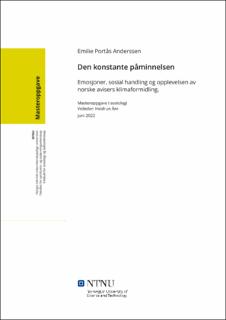| dc.contributor.advisor | Åm, Heidrun | |
| dc.contributor.author | Anderssen, Emilie Portås | |
| dc.date.accessioned | 2022-09-09T17:19:48Z | |
| dc.date.available | 2022-09-09T17:19:48Z | |
| dc.date.issued | 2022 | |
| dc.identifier | no.ntnu:inspera:104661660:22545764 | |
| dc.identifier.uri | https://hdl.handle.net/11250/3016983 | |
| dc.description.abstract | Klimaendringene er en av de største utfordringene vi står ovenfor i dagens samfunn. Allikevel vitner flere forskere om at det er en grad av likegyldighet knyttet til problematikken (Norgaard 2011; Giddens 2015). Denne masteroppgaven har som formål å lære mer om folkets opplevelse av norske avisers klimaformidling, og hvordan emosjoner knyttet til et komplekst og ofte negativt ladd tema slik som klimaendringene påvirker sosial handling.
Mitt arbeid bygger på teoretiske innspill fra sosiologer som, Giddens, Hochschild og Norgaard, samt tidligere forskning på klimaformidling og klimaendringenes plass i norske aviser. Spesielt Norgaards modell om strategier for emosjonshåndtering står sentralt som et teoretisk innspill til min oppgave. Gjennom blandede metoder, med en hovedvekt på empirisk materiale fra åtte kvalitative intervjuer, forsøker jeg å svare på problemstillingen hva kjennetegner klimakommunikasjonen i norske aviser, og hvordan reagerer mennesker på framstillingen av klimaendringene i avisene?
I arbeidet med min oppgave finner jeg at klimaformidlingen har vært preget av en sterk vekst de siste 20 årene. Samtidig er mediehyppigheten preget av svingninger knyttet til sentrale hendelser knyttet til klima. Gjennom min analyse utvikler jeg også konseptet om den konstante påminnelsen, og utforsker i hvilken grad man kan se på norske aviser som en leverandør av denne konstante påminnelsen om klimaendringene og dens konsekvenser. Videre finner jeg at norske aviser fortsatt står sentralt som formidler av kunnskap omkring klimaendringene. Derimot, gjennom å konstruere klimaendringer som et problem i et stort sett negativt lys, spiller media en ambivalent rolle. På den ene siden forteller informanter om at de bruker norske nettaviser aktivt i å innhente kunnskap om klimaendringene. På den andre siden trekker flere av informantene seg unna de norske nettavisenes klimaformidling. Ved å intervjue åtte mennesker, finner jeg at emosjoner står sentralt som en faktor for hvordan informantene opplever norske avisers klimaformidling, samt hvordan de velger å handle i møtet med de negative klimanyhetene. | |
| dc.description.abstract | Climate change is one of the biggest challenges we face in society today. Nevertheless, several researchers argue that there is a certain degree of indifference associated with the problem of climate change (Norgaard 2011; Giddens 2015). The purpose of this thesis is to learn something more about people's experience of the climate communication done by Norwegian newspapers, and how emotions related to a complex and often negatively charged topic such as climate change can affect social movement.
This thesis is based on theoretical input from sociologists such as Giddens, Hochschild and Norgaard, as well as research on the place of climate change in Norwegian newspapers. Norgaard’s model on strategies for emotion management is central as a theoretical framework for this thesis. Through a mixed methods design, with an emphasis on empirical material from eight qualitative interviews, I try to answer the thesis question what characterizes the climate communication in Norwegian newspapers, and how do people react to the presentation of climate change in the newspapers?
In working on my thesis, I find that climate communication has been characterized by a strong growth during the last 20 years. At the same time, the media frequency is characterized by fluctuating attention in the media, which is linked to key events related to climate change. Through my analysis, I also develop the concept of the constant reminder, and explore the extent to which one can look at Norwegian newspapers as a supplier of this constant reminder of climate change and its consequences. Furthermore, I find that Norwegian newspapers are still central as mediators of knowledge about climate change. On the other hand, by constructing climate change as a problem in a largely negative light, the media takes on an ambivalent role. On the one hand, informants say that they use Norwegian online newspapers actively in gaining knowledge about climate change. On the other hand, several of the informants withdraw from the climate communication done by the Norwegian newspapers, due to the focus on alarming news. By interviewing eight people, I find that emotions are a central factor in how the informants experience Norwegian newspapers' climate communication, as well as how they choose to act when facing the negative climate news. | |
| dc.language | nob | |
| dc.publisher | NTNU | |
| dc.title | Den konstante påminnelsen: Emosjoner, sosial handling og opplevelsen av
norske avisers klimaformidling. | |
| dc.type | Master thesis | |
